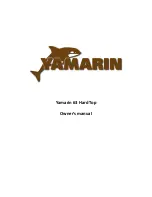
G
E N E R A L
I
N F O R M A T I O N
3–7
W
INDLASS
Anchoring can be less laborious if your boat has a windlass accessory. If your boat is equipped
with a windlass, reference your windlass Operation Manual for instructions.
G
ENERAL
I
NFORMATION
O
N
B
OAT
H
ANDLING
The best method of learning how to handle and obtain the best performance from your boat is
to practice and experiment. After several hours of operation, you should experiment with the
throttle settings to discover the setting that will be the most comfortable and economical range for
your particular load conditions.
We suggest that you make a speed and RPM chart to obtain the most economical operation.
Operate the boat at various speeds and check the fuel consumption. Compute the amount of
operating time remaining when the fuel gauge has only one bar remaining on the display. Make a
log of this type of information and have it available when using your boat. Other statistics you
may want to determine could include the following:
• Minimum speed for effective steering.
• Turning radius at different speeds.
• Response to steering at low speeds.
• Accelerating and deceleration rates.
• Time and distance to bring the boat to a stop at different speeds.
• Control of the boat using both engines in close quarters.
Also read the section in
Sportfish, Cruisers, Yachts Owner’s Manual
beginning on page 49
for
information on safe operating speed.
T
WIN
E
NGINE
B
OATS
Twin engine boats are easier to maneuver than single engine crafts. However, they still require
practice to ensure comfortable operation. The boat will run ahead or backward in a straight line
when both engines are working together at the same speed. The engines also can be used to steer
to port as well as starboard. Moving ahead on one engine will cause the bow to swing away from
the running engine side and to move forward at the same time. Backing up with one engine will
cause the bow to swing toward the running engine side and the boat to move backward. Running
one engine ahead and one engine astern will cause the boat to turn end-for-end in little more than
its own length. Running both engines in the same direction at different speeds will cause the boat
to move in the direction dictated by the faster engine but its influence will be modified by the
slower engine.
Содержание Tournament 275
Страница 8: ...W E L C O M E 1 4 ...
Страница 28: ...P E R F O R M A N C E 4 6 ...
Страница 32: ...I N S T R U M E N T A T I O N A N D S W I T C H E S 5 4 ...
Страница 48: ...W I N T E R I Z A T I O N A N D S T O R A G E 7 6 ...
Страница 63: ...2 7 5 T O U R N A M E N T 8 15 F u e l S y s t e m G A S GA S G A S Fuel Fill Vent Fuel Filters Primer Bulbs ...
















































